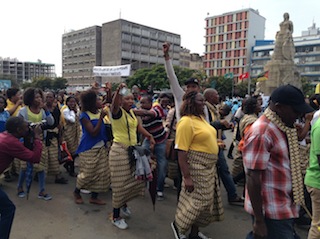Mozambique: Tractors for passenger transport only where roads cannot be built - Watch
Future Mozambique Labour Law will prohibit ‘physical searches’ and introduce paternity leave

File photo: A Verdade
The proposal for the revision of the Labour Law by government, employers and trade unions could introduce innovations that benefit Mozambican workers. Physical search of workers may be prohibited and paternity leave introduced along with other attempts to reduce sexual harassment in Mozambique labour sector.
Ten years after the entry into force of Law no. 23/2007, Filipe Nyusi’s executive has decided to move forward with a revision that should be ready in time to be approved by the Assembly of the Republic this year.
Although the Mozambican Workers’ Organisation (OTM) initially considered that the revision could “further contribute to the precariousness of jobs” and serve to “accommodate the interests of multinationals”, the Preliminary Draft that A Verdade has had access to shows numerous improvements in the protection of Mozambican workers.
The purpose of the proposal is to introduce the right to work, with the emphasis on “the duty to work, without prejudice to the limitations resulting from the reduction of work capacity due to occupational or common illness or disability”.
Individual rights will also be safeguarded, the new law recognising “freedom of expression, opinion and information”.
The revised mid-October draft extends the right to privacy such that it is “forbidden to the employer or any other person, to carry out the physical search of the worker, either at the entrance or at the exit, searching briefcase, bag, suitcase or any other type of receptacle intended for the storage of personal belongings”, while safeguarding “companies whose nature requires additional measures to control the entry and exit of persons, goods and products, which must create conditions for non-intrusive means of verification”.
It will also be “forbidden to carry out medical tests and examinations for the jobseeker or the worker in order to determine their HIV / AIDS status”.
Fathers to be entitled to a “paternity leave”
One proposal still being assessed and discussed by the government, employers and unions will incorporate some of the measures of the new Mandatory Social Security Regulations such as the extension of maternity leave from 60 to 90 consecutive days, as well as determining the age of compulsory retirement – 65 years for men and 60 years for women.
The revision will give fathers “the right to a seven-day paternity leave, every two years, whose enjoyment must be started the day immediately after the birth of the child”. In addition, the paternity leave shall also be “granted for 60 days in the event of death, incapacity, temporary or permanent, physical or mental, of the parent duly proven by a competent authority”.
The future Labour Law is also intended to monitor the protection movements of women and proposes to reinforce prevention of sexual harassment by detailing its manifestations as: “Any harassment and any inconvenient behaviour, discrimination, which is practised at the time of access to employment or even in their own employment, work or vocational training with the purpose of stirring, disturbing or embarrassing a person with gestures, words or violence, affecting their dignity, or giving rise to intimidating, discriminatory, humiliating or vexatious, hostile, destabilising physical and psychological health.”
In addition, “Any embarrassing act of a certain person, made with gestures, words or with the resort to violence that aims to obtain sexual favour or advantage” also constitutes sexual harassment
A Verdade has learned that this proposal for a revision must be submitted to the Council of Ministers before the end of this month so that it can be approved and later included in the list of matters that the MPs should consider and approve during the VIII Ordinary Session of the Assembly of the Republic that runs until December 20.
By Aderito Caldeira












Leave a Reply
Be the First to Comment!
You must be logged in to post a comment.
You must be logged in to post a comment.